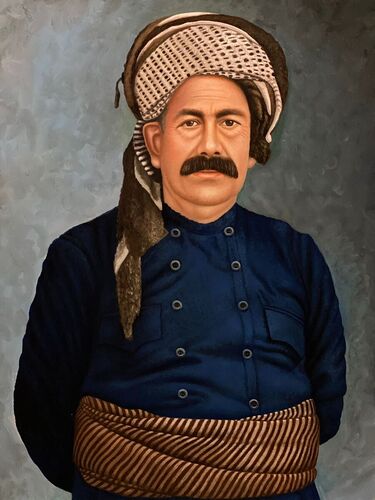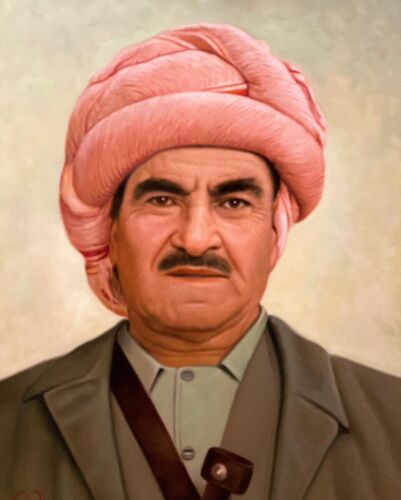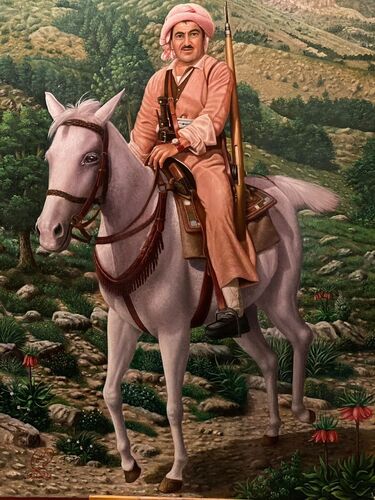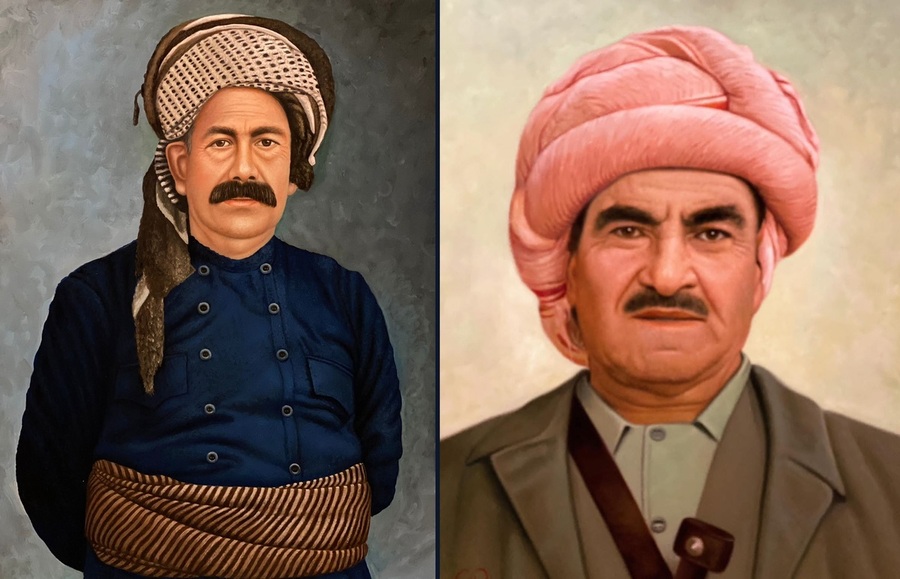As the historical sources and political analyses one of which is the great book "The Nationalist Movement of the Kurds" by "David Romano" have mentioned, in 1925 the British government and "Nations Society" decided to change the geography of the Middle East. Through this change, they decided to combine several non-Arabic states and some Arabic ones together to make a new state for economic and political purposes, or as socialists say they constructed/ fabricated nations. In order to do so, they attached the "Mosul state" or what is nowadays known as "Iraqi Kurdistan" to Baghdad and Basra states. After this, the combination of all these states became a new artificial country that is now known as Iraq in the history of politics. In other words, the state of Iraq was the result of Britain's planning and programs to create it so that they could reach the oil wells and energy sources much easier in the Middle East. Although as we will discuss it, this artifact and political act of Britain not only was not easily accessible for Britain or other countries of the region but it also started the fire of uprisings that are still flaming and burning.
The British government brought an Arab prince from a foreign land who was from the "Hashemi clan of Ordon" and placed him as the king of the new country they had recently established constructed of several ethnics and religions and introduced him to the political world of that era and imposed him to the people of that country; he was "Malik Faisal". However, before that incident, a sense of nationalism had been expressed by the Kurds. As "David Mc Duval" had said: establishing a superficial country named Iraq, was somehow rejecting the Kurdish elites' dreams of having an autonomic country for Kurds in the Middle East. On the other hand, the establishment of a national state for the Kurds could serve the British ambitions to some degree but the British were concerned about the conflicts and disunification of "Clans", "Tribes" and "Septs".

Sheikh Mahmoud Barzanji
Art Work by: Sa'adat Barzani
"Martin Van Bruinessen", the Dutch writer and socialist, discusses this topic in detail. He discusses that this political decision by Britain was declining the Kurdish dream. They wanted to plunder the oil sources of "Kirkuk" and "Mosul" via this plan and it is worth mentioning that both of these regions belonged to Kurdistan land. Despite knowing this fact, Britain made their final decision to establish the Iraqi government.
Several uprising and protesting movements began to appear in the Kurdistan opposing this decision of Britain and construction of the artificial state of Iraq from the very beginning of conducting this political plan. One of the most important uprisings was "Sheikh Mahmoud Barzanji's revolution". Sheikh Mahmoud's revolution possessed both characteristics of clan and nationalism uprisings. That is, it was wider than a clan uprising and more or less it possessed the features of a revolution that had the identity concerns however, it did not possess both of these types of uprisings completely.
The British government could not remain silent against these uprisings. Because the political and economic plans of this colonialist country would be threatened due to these uprisings. At that time, the Iraqi government did not have a strong and unified army. In 1919, Britain commanded its air forces to bombard the center of these Kurdish movements thus Britain recorded a black page in their relationship with the Kurdish revolutions. However, all the historical sources, one of which is "The National Kurdish Movement" by Chris Kochera, prove that after the bombarding of the Kurdish regions by the British army, the movements did not stop. So, in 1922, the British government in cooperation with the newly constructed government of Iraq announced an article about the Kurdish issue agreeing on these points. First, those Kurds inhabiting the new geography of Iraq can stay in this country but they only can take charge of their own region. Second, they have the right to protect their economic and political interests and they need to consult these issues with the Iraqi government and British government. The presumption of Britain was that the Kurdish clans and tribes must unify in order to make this regional state work and they will have this national unity.
After the British government assured the Iraqi state that agreeing with the Kurdish revolution did not mean they would be independent and separated from Iraq, they decided to accept the Kurds' rights. However, the struggles among the Kurdish people eliminated the chance of reaching the goal of having an autonomic state. A large number of the Kurdish clans resisted the Kurdish leader, Sheikh Mahmoud Barzanji. At the same time the revolutions that had happened in Turkey to construct a nationalistic route faced conflicts among each other. The newly established state of Turkey was planning and plotting against the Kurdish revolutionary movements. On the other hand, Sheikh Mahmoud Barzanji who was Britain's chosen leader of the Kurds was helping out the Turkish state and Ataturk in secret and in the lands under his authority, the Assyrian Christians living in northern Iraq were disturbed. These two subjects made Britain dissatisfied and they tried to break down Sheikh Mahmoud and exile him from Kurdistan.
However, as "Riva Simon" says: the Pan-Arabism ideology was gradually developing among the political leaders of Iraq. They wanted to create a dreamland for the Arab society. Thus, they only identified Iraq as the land of the Arabs and the Kurds, and the rest of the ethnicities of Iraq were forgotten.
Nationalism in Iraqi Kurdistan did not stop with the ending of Sheikh Mahmoud's authority by the British. However, it faced several different fates. After the British government withdrew its army from Iraq in 1933 or in other words, they accepted the independence of Iraq, the Iraqi government's method for confronting the Kurds changed deeply.

Mullah Mustafa Barzani
Art Work by: Sa'adat Barzani
after the British control over the Iraqi politicians was reduced, the Iraqis increased their pressure on the Kurds. Thus, new protests and revolutions would form in Kurdistan. Every new revolution in Kurdistan made the Iraqi army forces who were Kurds originally withdraw from the army. Because these Kurdish soldiers of the Iraqi army decided to leave the army and join the revolution forces of Kurdish nationalism. However, the Kurdish nationalist movements did not last much and could not expand more due to conflicts they had among themselves.
After all these dissatisfactions and revolutions, in 1943 a great revolution by "Mullah Mustafa Barzani" began in the Kurdistan of Iraq. This revolution was somehow stronger thus it made the British government come to the Iraqi army's aid. Mullah Mustafa's revolution was about to defeat the Iraqi army so both the Iraqis and the British forces began to design a plot to prevent this from happening as soon as possible. It was for the first time that the British had seen a phenomenal unity formed among the Kurdish clans and tribes under the leadership of a nationalist leader. Thus, they tried to separate the great clans from Mullah Mustafa's revolution. Along with these policies after they succeeded in separating some smaller tribes from the revolution, this time they aimed for the great clan of Zebari. After the Zebari clan withdrew from supporting Barzani and joined the Iraqi army, Mullah Mustafa's revolution faced its first defeat and they fled to Iran.

Mullah Mustafa Barzani
Art Work by: Sa'adat Barzani
But the big dream of Mullah Mustafa Barzani is to be known not only as the chief of a clan and tribe but also as the leader of a nationalist revolution. He did not abandon the dream of an independent Kurdistan so even after his first defeat he did not disappoint but rather left a part of Kurdistan just to go to another part of it to keep on his efforts to achieve the Kurdish dream in the East part of Kurdistan he played a great role in establishing the "Kurdistan Republic" in 1945 and 1946.








